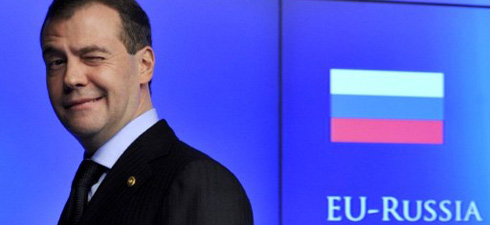The biannual summits between Russia and the European Union tend to leave the impression that the hatred is mutual, but that the two parties perform a delicate minuet around the dispute of the moment because they need each other. The summit just held in Brussels between Dmitry Medvedev and his European hosts, Herman van Rompuy and José Manuel Durao Barroso, has been no different.
Common interests are many and the respective values not quite compatible. And so the summits, while never reaching a break, never consummate the relationship, either. Europe imports a quarter of its gas and twenty percent of its oil from Russia.
So long as the Trans-Caspian gas pipeline and other initiatives fail to materialise, things will stay that way. To make matters worse, in this fateful hour, Europe is eager to see Russia come up with the 10,000 million dollars that Medvedev's economic adviser yesterday repeated that his country can contribute to the European rescue fund through the IMF.
Common interests but different values
In turn, though, Russia depends on Germany, its main economic partner, and on Europe in general, which buys half of what Russia sells. Moscow needs Europe as much as Europe needs Moscow. That is, as far as common interests go. But what about values? Europe wants Russia to cease blocking attempts to curb Iran and to undermine the tyrant in Syria, and of course, to cease being an uncouth autocracy.
But Putin, who has just perpetrated a fraud to keep his United Russia party in command of the Duma and is preparing another one for his return to the presidency in March, has other plans. Putin’s dream is of a Russia restored to the international power it had under the Tsars and under communism.
Values take a back seat
When interests coincide and values diverge, it is the values that take the back seat, as yesterday’s summit confirmed. But, indeed, one must keep up appearances. And so Van Rompuy spoke, almost whispering in the ear of the visitor, of “concern” about the electoral “irregularities” – a delicious understatement.
Medvedev had little interest in giving ammunition to the increasingly outspoken opponents of Russia and provoking an open confrontation with Brussels that could deepen the perception of international isolation. Hence his friendly tone, while Putin goes on sniping at Washington from Moscow. Perfect timing.
With Europe financially and politically weakened and Russia exposed to a risk of internal revolt for the first time in a decade, the struggle of the summit has been a struggle between two one-armed wrestlers. How to resolve such a situation in the world of high diplomacy? Very simply: by bringing up the matter of visas. And that's what they did, to be able to show some successes. Russia and Europe took the first step in doing away with visas – some day. Wonderful.
From Chisinau
1984 in 2011
"We are in 1984, edition 2011," writes Timpul in Chisinau, Moldova.
Strengthening the EU’s partnership with Russia will further isolate the UK from the EU.Remember those super-states imagined by George Orwell?Britain was part of Oceania, with America and Australia; Eurasia included the current EU plus the former USSR. The continental block (France and Germany) dominates the EU, and the British 'balancing factor' is sidelined.
We are facing an undeniable fact, Timpul notes:
... the Western Europeans are getting closer to Russia. Germany has a security partnership with Moscow, which also includes Russian troops withdrawing from Transnistria and a separate supply of natural gas (Nord Stream pipeline), while France is selling military technology to the Russians (Mistral ships).
Do you like our work?
Help multilingual European journalism to thrive, without ads or paywalls. Your one-off or regular support will keep our newsroom independent. Thank you!
















